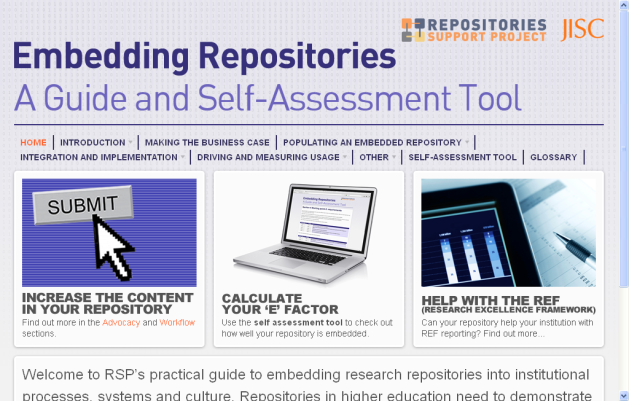UK RepositoryNet+ – a new infrastructure for UK Repositories
May 17, 2012 Leave a comment
A guest post by Andrew Dorward from UK RepositoryNet+
UK RepositoryNet+ is a socio-technical infrastructure supporting deposit, curation & exposure of Open Access research literature. The aim of the UK RepositoryNet+ project is to increase the cost effectiveness of repositories of such literature. It will do this by offering a sustained and well-used suite of services that enable repositories to operate more cost effectively. Specifically UK RepositoryNet+ will:
- scope and deliver repository and curation services via a production environment that offers economies of scale and scope
- set up a production environment for repository shared services which works closely with the proposed innovation environment
- provide market research/ intelligence, quality assurance, business case and sustainability planning to support the project.
Sustainability planning is a key outcome, operating at several levels. Institutional support of repositories ultimately requires that they meet institutional objectives – for example, embedding institutional repositories through integration with university research support offices, thereby to ensure compliance with Funders’ mandates and submission to the Research Excellence Framework. The central task for RepositoryNet+ is to provide sustainable infrastructure with service-quality components that assist cost-effective ingest, quality improvement and continuity of access for repository content.
The RepNet project has had a busy 3 months since March, starting with the selection of service providers for Wave One functionality, and the start of development. Following our recommendations to the JISC Oversight group in January, work has been commissioned with our Services and Innovation Partnership Group (SIPG). This currently comprises Mimas, the University of Nottingham Centre for Research Communications, EDINA and UKOLN. Mimas will be providing benchmarking and reporting functionality through the development of IRUS-UK from a demonstrator to a full service. Nottingham contribute help with deposit through providing information on funder and publisher’s policies through the RoMEO and JULIET databases, while EDINA enable deposit into institutional repositories with the R-J Broker and Organisation and Repository Identification services. UKOLN will be responsible for the Innovation Zone, which will be used as an incubation site for potential new services.
Following a round of workshops in April, we have received business proposals for provision of services, and expect to have these finalised by the end of May to allow funding to kick in and development to kick off in June.
This will provide the first wave of services to be officially launched at OR12 in July, when we will showcase the service to users. We will be presenting a paper on the RepNet project at the main conference, and will also be running a workshop on the morning of Tuesday 10th July with the SIPG and prospective users. We hope to gain some insight into new services needed as part of our Wave 2 set of components, so would welcome attendance and input from UK-CoRR and RSP.
Further research on user requirements on search functionality has been commissioned from Key Perspectives Ltd. Their report, due in July, will help decide whether to further invest in a dedicated search tool or in improving repository metadata to be indexed by commercial providers. Further research on the requirements of research information managers was undertaken by Glenaffric and delivered in April.
Other external projects that will influence the future direction of the RepNet service and Wave 2 components include the RIOXX work to develop an application profile for IR systems to support an extended metadata set to encompass funding data and the UKRISS project on research information management.
More details on the RepNet project can be found on our production website at http://www.repositorynet.ac.uk/ and this presentation: RSP Update on RepNet May 2012
For more information please contact the RepNet Business Manager, Andrew Dorward at andrew.dorward@ed.ac.uk.








